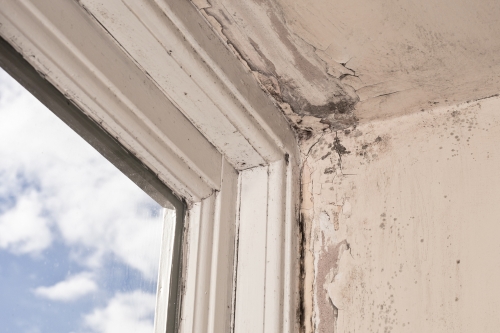While our homes usually have good ventilation to help prevent mould growth, garages are another matter. Mould loves areas of high moisture and humidity, meaning garage environments, in particular, can provide a damp and musty haven for mould growth.
Why is Mould Common in Australian Garages?
The garage can often become a neglected part of the house. We use it to store tools, unused items, storage containers full of souvenirs and unwanted gifts… in fact, it can quite easily turn into more of a junkyard than anything!
Boxes of stored belongings and stacks of magazines or newspapers can get mouldy. Camping equipment can get particularly mouldy, especially if put away when still damp. In addition, driving a car into the garage in rainy weather brings in a lot of water that can lead to mould growth.
The Risks of Having Mould in Your Garage
Mould in your garage can cause all the same health problems as mould in your house.
And because garages are not airtight, mould spores can make their way into your home from the garage. Not only can this make you sick but also mould spores can then settle in your home and start growing.
Mould can lead to serious health problems, including asthma attacks, pneumonia, other respiratory disorders, migraine headaches and allergic reactions.
A Good Garage Door Can Help Protect from Mould
Your garage door is key to keeping moisture out of your garage. Essentially, to reduce the risk of mould in your garage you want to keep water out and keep sunlight in. Focus on making sure your garage is:
- Dry
- Well ventilated
- Full of natural light
- Well-sealed
Having the right garage door will give you control over these factors, protecting your garage, stored items, and your family’s health.
Keeping Your Garage Dry and Well Ventilated
The key to keeping your garage mould-free is to make sure it’s dry and well ventilated. Mould simply won’t flourish in an area that’s bone dry and airy, as opposed to damp and musty.A simple way to keep weather and mould out is to add a seal around the garage door. These may need to be checked and replaced to ensure the protection of your door and your garage contents. There are seal options for dust and fire proofing, contact Impact Garage Doors for more information.
If your garage door isn’t protecting your garage interior from the elements, allowing rain inside, replacing or upgrading the door will be your best defence against mould.
When choosing a garage door, talk to a professional about recommending a product that will ensure dryness and ventilation. Tilt doors, for example, offer a perfect solution for enabling airflow and ventilation.
Sunlight, the Natural Mould Killer
One of the best ways to deter mould from your garage is to let in some sunlight. Mould hates sunlight! Impact Garage Doors offer Perspex garage doors, which lets a lot of natural light in, keeping your garage dryer, brighter and reduces the build-up of mould.
Unless you’re home during the day, it’s impractical to leave your garage door open for hours at a time. A windowed garage door that allows sunlight to stream in is a great solution for this.
Choose Mould-Rejecting Materials
Did you know that mould also hates aluminium? Metal and aluminium are great inhibitors of mould and can really help prevent mould from forming.
So when choosing a garage door, consider metal or aluminium products – mould won’t grow as well on these products, reducing your risk of mould spreading through your garage and home. Talk to a professional garage door supplier about products such as Gliderol steel roller doors or panel glide overhead doors – their sleek metal materials are a good bet against mould.
For more advice and information about replacing or upgrading your garage doors, talk to the team at Impact Garage Doors in Wollongong. Call 02 4044 0809 or simply contact us online.


